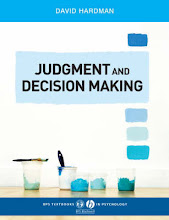In a recently-published study Eduardo Andrade and Dan Ariely have shown that short-lived emotions can indirectly influence decisions that are made after the emotion has dissipated. Several previous studies have shown that emotions like happiness and anger can influence decisions that are made whilst the emotion is still current. There have also been a few studies whose results suggest that current emotions might influence future decisions, even though they were not specifically designed to assess the time course of decision making. In one classic study, men who spoke to a female interviewer whilst crossing an apparently dangerous (vs. safe) bridge were more likely follow up on an opportunity to telephone her later. The proposed explanation for this was that men on the apparently dangerous bridge mistook their feelings of danger-induced arousal for feelings of sexual arousal.
The new study by Andrade and Ariely involved the ultimatum game, in which a proposer offers a share of $10 to another person (each is typically anonymous to the other). The responder can either accept or reject this offer, but if the offer is rejected then neither person gets to keep any of the money. In the current study, the game was rigged so that 51 students received a derisory offer of $2.5. However, just prior to playing this game each student had watched a video clip designed to induce feelings of anger or happiness (respectively, a clip from the film "Life as a House" and a clip from "Friends"). Emotion ratings showed that these clips had the desired effect. Furthermore, compared to students in the happy group, those in the angry group were more likely to reject the offer of $2.5.
At this point, the students engaged in a filler task concerning "pictures and memory". A subsequent emotion rating - embedded within other questions in order to be less obvious - showed that the earlier feelings had dissipated. The students were then asked to engage in another ultimatum game, except this time they were the proposers rather than the responders. Andrade and Ariely predicted that those in the angry group would make fairer offers than those in the happy group. The rationale for this prediction was that the participants would look back on their earlier behaviour and try to behave in a consistent fashion. Thus, people who had previously felt angry about being treated unfairly would subsequently try to behave in accordance with their earlier emphasis on fairness.
The results were consistent with this prediction. Those in the angry condition kept a mean of $5.8 for themselves, whereas those in the happy condition kept $6.5. Further analysis indicated that it was the previous choice, rather than the earlier emotion that directly influenced the offers made, which supports the view that people try to behave consistently with their earlier behaviour. But, of course, the earlier emotion indirectly affected this later decision through its effect on the first one.
However, one alternative account of the ultimatum game behaviour suggests that proposals might have been based on a false consensus effect - the belief that other people tend to share one's own beliefs and attitudes. In a final component of the study, the students played the role of proposer in a dictator game. This is like the ultimatum game, except that the recipient of any offer does not have the power to reject it; therefore the size of an offer made cannot depend on one's belief about the likelihood of the other person rejecting it. Those in the angry condition kept a mean of $7 for themselves, whereas those in the happy condition kept $8 for themselves, although the difference fell short of conventional statistical significance (p = .08 for this comparison). In this respect, the results offer some further support for the consistency-based explanation, but only tentatively so.
Across the study overall, students in the angry group made a total of $12.5 compared to $14.3 for those in the happy group.
In summary, the results indicate that even transient emotions can have an influence on future decisions. It remains to be seen just how long-lasting such influences might be.
Reference
Andrade, E.B., and Ariely, D. (2009). The enduring impact of transient emotions on decision making. Organizational Behavior and Human Decision Processes, 109, 1-8.
Friday, 5 June 2009
Subscribe to:
Post Comments (Atom)
About Google Analytics
This website uses Google Analytics, a web analytics service provided by Google, Inc. (“Google”). Google Analytics uses “cookies”, which are text files placed on your computer, to help the website analyze how users use the site. The information generated by the cookie about your use of the website (including your IP address) will be transmitted to and stored by Google on servers in the United States . Google will use this information for the purpose of evaluating your use of the website, compiling reports on website activity for website operators and providing other services relating to website activity and internet usage. Google may also transfer this information to third parties where required to do so by law, or where such third parties process the information on Google's behalf. Google will not associate your IP address with any other data held by Google. You may refuse the use of cookies by selecting the appropriate settings on your browser, however please note that if you do this you may not be able to use the full functionality of this website. By using this website, you consent to the processing of data about you by Google in the manner and for the purposes set out above.




No comments:
Post a Comment